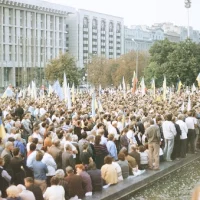Remembered as one of the most tragic victims of European imperialism, the Belgian Congo suffered decades of exploitation, violence, racism and repression. By restricting access to higher education and monopolizing political and military leadership positions, the Belgians maintained an iron hold over their resource-rich colony. Then, after a wave of African independence movements and without… Read More "Losing “The Congolese Bet” — The Belgian Congo’s Violent Road to Independence"
The Strange Case of Ngo Dinh Can
It sounds like a scene out of a movie: a corrupt dictator attempts to flee the country with the help of the American Consul, but is stopped by a CIA agent who arrests him. However, this is a very real event that took place in Vietnam in the fall of 1963. While his brother, Ngô… Read More "The Strange Case of Ngo Dinh Can"
A Brief History of the Consular Service
When most people think about consular matters, if they think about them at all, it’s only because they are having difficulties in a foreign country or because they have to apply for a visa to travel, study, or immigrate abroad. However, in focusing only on these functions, as important as they are, we also overlook…
The State Department is not exactly known for its jocularity but once in a while, it can have its fair share of pranks. When April Fool’s Day rolls around, local officials may pull pranks on Foreign Service Officers, who in turn have occasionally played jokes on their fellow officers and superiors (which does not always… Read More "April Fool’s Day in the Foreign Service"
The War in Bosnia and the Moral Dilemma of Refugees
The Bosnian War, which began April 5, 1992, was the result of the breakup of Yugoslavia. Pressure began to build in Bosnia-Herzegovina in February 1992 after the government passed a referendum for independence from Yugoslavia, which further exacerbated ethnic tensions in the already tense territory. Bosnian Serbs, who wished to be united in a Greater… Read More "The War in Bosnia and the Moral Dilemma of Refugees"
Guns and Ganja: Marijuana Usage in the Foreign Service
Like many countries, the U.S. has recently grappled with the issue of how to deal with marijuana usage: Should it be legalized or merely decriminalized? What about the use of medical marijuana? What are the human costs if possession is a felony? And what are the costs if it’s readily available? The following excerpts provide… Read More "Guns and Ganja: Marijuana Usage in the Foreign Service"
The Downing of KAL Flight 007
On August 30, 1983, a Boeing 747, Korean Airlines 007 took off for Seoul from New York’s John F. Kennedy International Airport. With 246 passengers and 23 crew on board, the routine yet ill-fated flight would never complete the second leg of its journey from Anchorage to Gimpo Airport. Significantly off course, Captain Chun Byung-In… Read More "The Downing of KAL Flight 007"
Consular Tales from Croatia — The Good, The Bad, and the Bianca Jagger
The Bosnian War spanned from April 1992 to December 1995 and was a result of ethnic tensions that boiled over after Bosnia declared independence from Yugoslavia. Bosnia was split between Muslim Bosniaks, Orthodox Serbs, and Catholic Croats. Neighboring Croatia, which had declared independence earlier, sought to incorporate parts of Bosnian territory into Croatia and supported… Read More "Consular Tales from Croatia — The Good, The Bad, and the Bianca Jagger"
“With Ukraine, Russia is an empire. Without it, Russia is just another country.” The history between these two is long and often fraught with conflict. Before the current protests in Ukraine over relations with Russia, Ukraine had to fight to free itself from the Soviet Union. Official independence was declared August 24, 1991 and with… Read More "Ukraine’s Push for Independence"
Sneaking into Bulgaria: An Affair on the Orient Express
Travelling can be a fun, rewarding experience. Except when it’s not. David Fischer, who was a consular officer in Sofia from 1972-74, tells of one particular gentleman who probably wished he had stayed home. He was interviewed in 1998 by Charles Stuart Kennedy and Robert Pastorino. Read More "Sneaking into Bulgaria: An Affair on the Orient Express"


